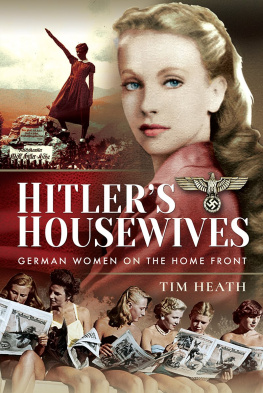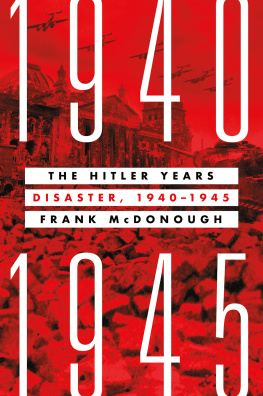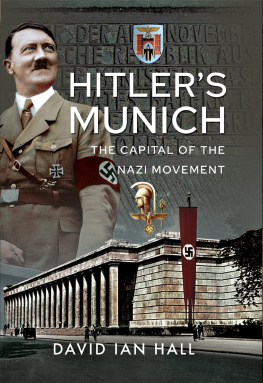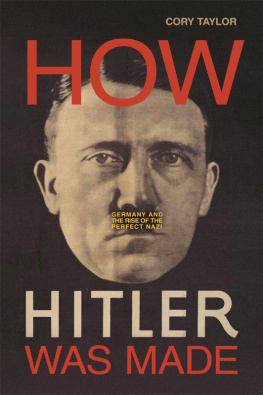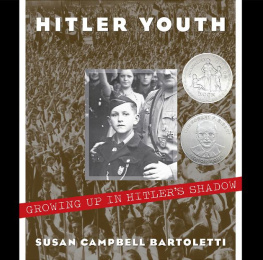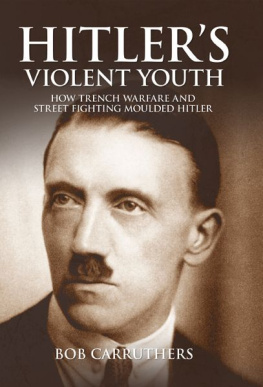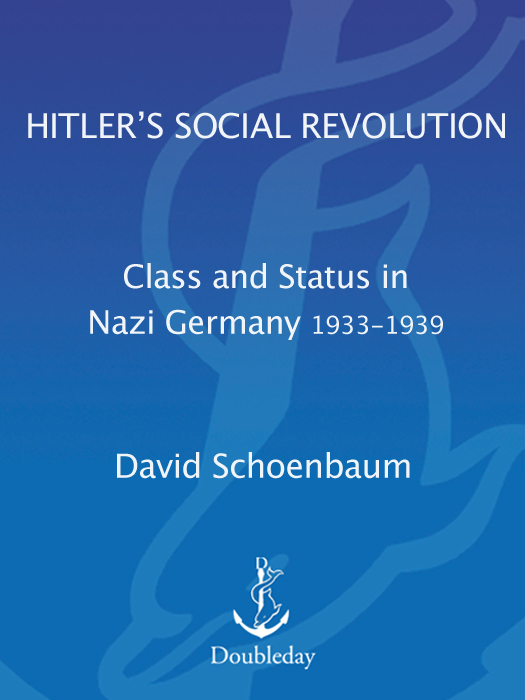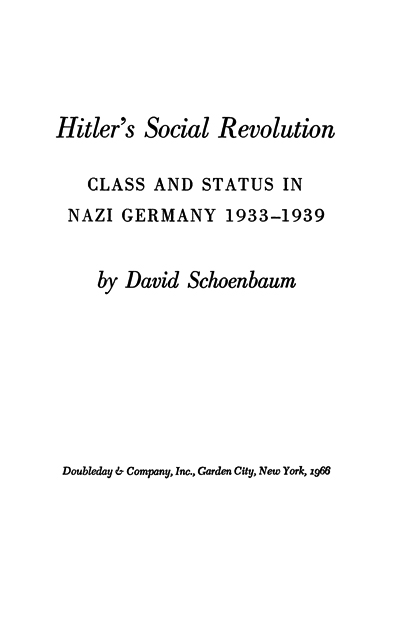Library of Congress Catalog Card Number 6617420
Copyright 1966 by David Schoenbaum
All Rights Reserved
eISBN: 978-0-307-82233-8
v3.1
To My Parents
Preface
T HIS BOOK originated as a dissertation at St. Antonys College, Oxford. The Warden and Fellows of St. Antonys, and their librarian, Miss Anne Abley, are entitled to sincerest thanks for supporting me in it. This applies particularly to James Joll, without whose patience this book might well not exist at all.
Thanks are also due to the Alexander von Humboldt Foundation, Bad Godesberg; to Mrs. Ilse Wolff of the Wiener Library, London; to Drs. Thilo Vogelsang and Anton Hoch of the Institut fr Zeitgeschichte, and the Inter-Library Loan Department of the Bayerische Staatsbibliothek, Munich; to Dr. Heinz Boberach of the Bundesarchiv, Koblenz; and to Miss Lucille M. Petterson of the U. S. Document Center, Berlin.
I owe a special word of thanks to my colleagues T. W. Mason and P. G. J. Pulzer for their criticism and stimulation; to Professor K. D. Bracher for setting me on my way, and to Professor Kurt Schmitt for whatever statistical inspiration I might have to show.
I also want to thank Lieutenant General Hermann Boehme and Dr. Otto Strasser, Munich; Herr Hans Schwarz van Berk, Stuttgart; and Herr Hans Schaumann of the Deutsche Angestellten-Gewerkschaft, Munich, for submitting to interviews.
A final word of thanks is due my wife, who in 1945 knew more about the Third Reich than she ever wanted to know, but who now knows still more.
Contents
Introduction
T WO DECADES since its fall and over three since its rise, we know much about the Third Reich. The careers and personalities of its leaders have been reviewed at length. Its foreign policy, military operations, ideology, institutions, press, economy, and art, schools and universities, its conduct of justice and mass exterminationall have captured the historical imagination, all have been analyzed and reported in detail. In turn, they have been subsumed in the common denominators of totalitarianism and fascism. What remains is more detail. The odds are against a documentary Rosetta stone, capable by itself of casting new and pervasive light on what till now has been unrelieved darkness.
Despite all we know, a lot remains to be understood. The Third Reich was the closest approximation to date of those last days of mankind that Karl Kraus had already anticipated a decade before Adolf Hitlers appointment as Reichskanzler. This is presumably self-evident to all but the ignorant or the willful, and acceptable to Germans and non-Germans, East and West alike. But how it happened, why it happened, what it specifically meant to those to whom it happenedthese are matters of understanding. They are no less matters of controversy.
Characteristically, East and West tend to different answers, but both predate the Cold War. They have dominated discussion since 1933. Both, in their historical derivation, point to the obvious limits and even dangers of historical interpretation. One answer identifies the Third Reich as a class phenomenon: the victory of capital over labor with its inevitable capitalist consequences. The other identifies it as a national phenomenon: Hitlers victory as the victory not of German capitalism but of the German character, with Hitler as the proto-German. With amusing consistency, the latter thesis unites those, like William L. Shirer, who would indict Hitler as the gaudy consummation of German history and those, like A. J. P. Taylor, who would in effect exonerate him as a vigorous but basically typical manifestation of it.
Neither theory is easy to dismiss. After a slow start, Hitler fought communism. He opposed the Socialists from the beginning. De jure and de facto, his victory meant the end of the working-class parties, of unions, worker representation in industry, and collective bargaining. On the other hand, capital and industry financed Hitlers party and went on to finance, and profit from, Hitlers war.
That Hitler, whether in his weakness for pastry, for shepherd dogs, for national self-glorification, or for continental expansion, was in the main stream of modern German history is no less obvious. However eccentric his interpretations, his sympathies and antipathies were of the stuff of German life, whether they affected art or politics. Of his millions of voters before 1933 and his delirious mass audiences afterward, very few were consciously endorsing his originality.
The questions remain. As they had been in 1914, Germanys working classes in 1933 were the best organized in Europe, the best educated, and among the larger European nations, the strongest. They nonetheless folded overnight without even the shot of protest that salvaged the self-respect of their Austrian comrades a year later. Why? In the twelve years that followed, they produced heroes. But they failed, in any effective sense, to produce resistance. Their marginal protest in the years 193339 was economic, not political, a matter of wages and hours and not, it seems, of fundamental opposition. Why? In September 1939 they marched like everybody else. Between 1916 and 1918, in the midst of the first total war, they had struck. There were no strikes between 1943 and 1945. Why?
The role of capital poses similar problems. However it allowed itself to be bullied, German business helped itself to a large piece of cake. Fritz Thyssen nonetheless fled. The Krupps, whatever their policy afterward, did not finance Hitler before 1933. Does class interest account for both Siemens co-operation with the Third Reich and Boschs opposition to it? Apparently under-represented in the ranks of the organized opposition, leaders of German business covered Carl Goerdeler and Ulrich von Hassell for years on end in their efforts to organize the most effective opposition the Third Reich had to show. Why?
If the projection of presumable class interests fails to answer these questions, the alternate solution, the Germans, is no better. Between 1933 and 1941, an estimated thirty-five thousand non-Jewish Germans, not all of them Socialists, went into exile. In April 1939, over three hundred thousand Germans were in concentration camps, among them Kurt Schumacher who ten years later was to accuse Konrad Adenauer of being The Chancellor of the Allies. Can we assume that the Germans inside the concentration camps were somehow less German than those outside? Did the formula German equals Nazi occur to the foreign inmates of Buchenwald who spontaneously honored their German comrades on their common liberation in 1945?
The subsumption of the Third Reich in the larger categories of totalitarianism and fascism again introduces as many questions as it answers. The concept of totalitarianism undeniably does justice to the last stages of Hitlers Reich, as it does to Stalins. Even here there are important differences, among them the role of the parties in the respective one-party states, in Stalins relative weakness for purges and Hitlers relative indifference to them, in Hitlers uniquely dynamic foreign policy and Stalins characteristic diplomatic conservatism.
But does totalitarianism really tell us what we need to know about how this final stage was reached? Can we assume a meaningful identity between a conspiratorial group of highly intellectual professional revolutionaries and a heterogeneous collection of provincial cranks; between an underdeveloped country with a vast rural population in the throes of industrialization and a well-developed industrial society in the midst of a worldwide economic crisis?


